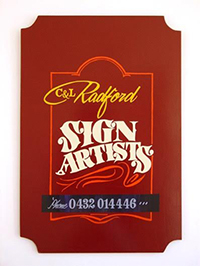
Lisa Radford (with Charles Radford)
I should’ve done this years ago (I asked him to make some signs for me, I asked him to make a sign for himself) 2007
Saturday 5 September, 2-4pm
FREE event, includes afternoon tea
RSVP essential muma.rsvp@monash.edu or 03 9905 4217
Celebrate fathers and creativity at this informal discussion as contemporary artists reflect on their relationships with their fathers, the roles their fathers have played in their work and their fathers’ influence on their respective artistic practices.
Participating artists: Catherine Bell, Leslie Eastman, Sanja Pahoki, Nikos Pantazopoulos, Spiros Panigirakis and Lisa Radford.
The program coincides with the current MUMA exhibition Dominik Lang: Girl with Pigeon, which takes a work of the Czech artist’s father Jiří Lang (1927-1996) as the departure point for the installation.
Catherine Bell
‘When my father passed away on Father’s Day 2003, I was in the early stages of my PhD at Monash University. I was investigating how performance artists produce work that facilitates catharsis and I was using my body as a site for interrogating the lived experience and visualising personal and societal trauma. The unexpected death of my father serendipitously became the subject of my studio inquiry and continues to influence and inform my practice and its thematic underpinnings.’
Leslie Eastman
‘In 2002 I filmed every house on College Road, the street central to the many stories that my father told of his childhood in Dulwich, London. The inventory of College Road was an attempt to subtantiate these stories, to validate and authenticate a history. The dual screen projection shows that inventory footage alongside images of the remarkable Thames Tunnel at Greenwhich engineered by Brunel.’
Sanja Pahoki
Sanja Pahoki’s family looms large in much of her practice; she has investigated mother-child relationships and featured her parents and grandparents as both the subject matter of, and the protagonists in, in her photographic and video work.
‘I may never have been interested in art/photography if it wasn’t for my father. I have these hazy romantic memories of living with my family in a one-bedroom apartment in Croatia and of my dad earning some extra cash as a freelance photographer. The bathroom was used as a make-shift darkroom. As a child, I remember looking up and being fascinated by the serpentine lines of B&W negatives, pegged and left to dry in various locations around the apartment.’
Pahoki’s recent installation, My baby shot me down centres around an intriguing photograph taken of the researcher by her father when she was three years old; featuring a very serious-faced young Pahoki holding a toy rifle. In psychoanalytical thought, transitional objects are defined as physical objects, which take the place of the mother-child bond. Typical examples of transitional objects are soft toys and blankets. In this case the significance of the gun as transitional object is considered.
Lisa Radford
Lisa Radford has worked collaboratively with her father Charles Radford – ‘a sign writer by trade and a Sunday painter by night’ – on a number of projects and exhibitions. Since she first appropriated one of his canvas boards whilst she was in art school, painting her ‘bit ‘over it, Radford has since invited her father to collaborate with her.
Lisa and her father researched the Radford family coat of arms and developed a series of paintings from these sources for the group exhibition Old Skool at PICA (curated by Hannah Mathews and Robert Cooke). Extending their collaboration they worked on a series of memory maps of their old neighbourhood, Coburg, incorporating shops, events, friends, funny incidents, objects etc. Lisa’s participation in the program will be a personal letter about her relationship and collaboration with her father.
Nikos Pantazopoulos
Nikos Pantazopoulos is interested in the intersection between content and form; he explores the emancipated potentials of the contemporary queer immigrant and associative complexities of the psychoanalytic sexuality. By using research and analysis as core material he attempts to discipline and de-problematize democratic repressed and governed spatial systems.
‘It is difficult to talk about the relationship that I have to my father without talking about its entanglements to other porous associations that contest the patriarchal system.’
Spiros Panigirakis
‘My father hovers around my work on a literal level as I regularly produce my work in my parent’s yard. This hovering that carries with it rudimentary technical advice, critique and familial baggage also is a starting point to think about the notion of the father on a psychoanalytic and political level more broadly. So my father’s influence on my work isn’t necessarily about one particular personal narrative but potentially is paradigmatic of how power is distributed within the social realm.’
